Evening Breathwork Routines for Calmer Sleep with BPD
✨ Introduction
Living with Borderline Personality Disorder (BPD) often means that nights are not restful but restless. Instead of sliding into sleep, the mind races with fears of rejection 💔, replayed conflicts, or anxiety about tomorrow. Many people with BPD describe nights as the hardest part of their day—the quiet magnifies emotional pain, and insomnia can deepen mood instability.
One of the simplest yet most effective tools for calmer sleep is breathwork. The way we breathe directly affects the nervous system, stress hormones, and even the quality of rest. Creating an evening breathwork routine helps signal to the brain: “It’s safe to rest.”
This article explores:
🌀 Why people with BPD struggle with sleep.
🌬️ The science of breathwork for sleep.
🧘 Step-by-step evening routines.
🌿 Supplements that complement breathwork.
🛋️ How therapy and lifestyle practices integrate.
By the end, you’ll have a toolkit for calmer nights and steadier mornings.
Looking for supplements for people with BPD? Click here.
🌪️ Why Sleep Is Difficult with BPD

Common struggles:
Racing thoughts 🌀 → replaying conflicts or abandonment fears.
Heightened arousal ⚡ → nervous system stuck in “fight or flight.”
Emotional hangovers 😢 → pain from the day resurfacing at night.
Irregular routines ⏰ → difficulty winding down consistently.
Consequences:
Poor sleep worsens mood swings.
Fatigue increases impulsivity.
Lack of rest intensifies fear of abandonment.
👉 Breaking this cycle requires calming the nervous system before bed—and breathwork is the most direct tool.
🌬️ The Science of Breathwork and Sleep
How breath affects the body:
Slow exhalations → activate the vagus nerve 🧵, lowering heart rate.
Diaphragmatic breathing → signals safety, reducing cortisol.
Rhythmic breathing → synchronizes heart and brain rhythms, promoting relaxation.
For people with BPD:
Breathwork creates a pause between emotional reactivity and sleep, reducing the late-night spirals that often fuel insomnia.
Want to try Breathwork? Click Here.
🧘 Evening Breathwork Routines for BPD
Here are structured routines you can practice each evening.
🕊️ Routine 1: Extended Exhale Wind-Down
Why: Great for calming anxiety and racing thoughts.
Steps:
Sit or lie comfortably.
Inhale gently through the nose for 4 seconds.
Exhale slowly for 6–8 seconds.
Repeat for 5–10 minutes.
👉 Effect: Activates parasympathetic system, reduces panic.
🌊 Routine 2: Resonant Breathing for Stability
Why: Synchronizes heart and breath for emotional balance.
Steps:
Inhale for 6 seconds.
Exhale for 6 seconds.
Continue for 10–15 minutes.
👉 Effect: Stabilizes mood, reduces abandonment fear before sleep.
🟦 Routine 3: Box Breathing for Overthinking
Why: Structured pattern grounds scattered thoughts.
Steps:
Inhale 4s ⬆️
Hold 4s ➡️
Exhale 4s ⬇️
Hold 4s ➡️
Repeat 4–8 cycles.
👉 Effect: Creates mental stillness, helpful if ruminating.
🌙 Routine 4: 4-7-8 Breathing for Deep Relaxation
Why: Popular technique for falling asleep faster.
Steps:
Inhale 4s.
Hold 7s.
Exhale 8s.
Repeat 4–8 cycles.
👉 Effect: Strong nervous system reset, prepares for deep rest.
🎶 Routine 5: Humming Exhale for Soothing
Why: Vibrations stimulate vagus nerve and calm emotions.
Steps:
Inhale deeply.
Exhale slowly with a soft hum.
Continue for 5 minutes.
👉 Effect: Emotional soothing, reduces loneliness before bed.
✋ Routine 6: Hand Tracing Breath
Why: Combines breath with touch = double grounding.
Steps:
Place one hand flat.
Trace each finger with other hand:
- Inhale 5s going up finger.
- Exhale 5s going down.
Continue until all fingers traced.
👉 Effect: Anchors attention, pulls out of dissociation.
🌿 Supplements to Support Calmer Sleep with Breathwork

Supplements can enhance the effects of breathwork by calming the nervous system.
Magnesium (glycinate/threonate) 🧂
Relaxes muscles + nerves.
Best taken 30–60 minutes before bed.
L-Theanine 🍵
Creates calm focus.
Works well with breathwork for slowing thoughts.
Reishi Mushroom 🍄
Promotes deeper, restorative sleep.
Glycine 🌸
Amino acid that cools body temperature for sleep.
Omega-3 Fatty Acids 🐟
Support mood balance, reduce nighttime ruminations.
⚠️ Always consult with your doctor about interactions with psychiatric medications.
Looking for supplements for people with BPD? Click here.
🛋️ Therapy + Evening Breathwork
Dialectical Behavior Therapy (DBT)
Evening breathwork = distress tolerance skill for nighttime spirals.
Schema Therapy
Fear of abandonment often spikes at night.
Breathwork helps stay present with emotions instead of dissociating.
Mentalization-Based Therapy (MBT)
Breath creates space for reflection before reacting to nighttime fears.
👉 Breathwork makes therapy skills easier to access in the moment.
Looking for online therapy for people with BPD? Click Here.
📅 Building a Consistent Evening Routine
Example Routine:
9:00 PM – Wind-down
Turn off screens, dim lights.
9:15 PM – Supplements
Magnesium + calming tea.
9:30 PM – Journaling
Write out fears or gratitude.
9:45 PM – Breathwork
Choose 10–15 minutes (Resonant or 4-7-8).
10:00 PM – Sleep Preparation
Gentle music or white noise.
👉 Consistency tells your nervous system: “It’s safe to rest.”
🧩 Case Example
Clara, 32, diagnosed with BPD:
Struggled with racing thoughts and panic at night.
Began nightly routine: magnesium + journaling + 10 minutes of resonant breathing.
After 4 weeks: reported falling asleep 30 minutes faster, fewer nightmares, and calmer mornings.
🚧 Limitations and Cautions
Not a replacement for therapy or medication.
Trauma survivors may feel discomfort slowing breath → start gently.
Must be practiced consistently for lasting results.
Sleep issues can also stem from medical conditions—get checked if severe.
🌟 Conclusion
For people with BPD, evenings can bring overwhelming emotions, abandonment fears, and restless insomnia. But with breathwork routines, it’s possible to guide the body into safety and rest.
🌬️ Breathwork calms the nervous system.
🌿 Supplements enhance relaxation.
🛋️ Therapy supports deeper healing.
Together, they create evenings of peace and mornings of renewal 🌅—a gift for anyone living with BPD.
👉 Sleep doesn’t have to be a battle. With breath and consistency, rest becomes a refuge.
📚 References
Linehan, M. (1993). Cognitive-Behavioral Treatment of Borderline Personality Disorder. Guilford Press.
Porges, S. (2011). The Polyvagal Theory. W.W. Norton.
Jerath, R., et al. (2015). Physiology of long pranayamic breathing. Medical Hypotheses, 85(5).
Huberman, A. (2021). Toolkit for Sleep. Huberman Lab Podcast.
Sarris, J., et al. (2016). Nutraceuticals for mood regulation. American Journal of Psychiatry, 173(6).
Related Posts
-
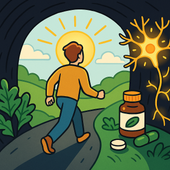
Post-Traumatic Growth and Supplements That Support It
After trauma, true healing means more than survival — it’s transformation. Learn how post-traumatic growth happens in the brain and body, and explore natural supplements like magnesium, ashwagandha, saffron, and omega-3s that support resilience, clarity, and emotional repair.
-
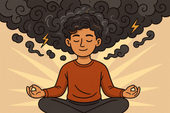
How to Regain Focus After Emotional Stress
After emotional stress, your nervous system feels frayed — your focus fades, thoughts race, and calm seems impossible. Learn how to restore balance, rebuild concentration, and retrain your brain for clarity and peace through evidence-based mind–body tools. 🌿
-

The Future of Sleep Supplements
The future of sleep supplements is here — where science meets nature. Discover how next-generation formulas use adaptogens, amino acids, and biotech innovations to support deep, restorative sleep without dependency. 🌙
-

Emerging Research on Sleep and Nootropics
Can nootropics help you sleep better? Discover how compounds like L-theanine, magnesium threonate, ashwagandha, and Alpha-GPC influence neurotransmitters, circadian rhythm, and brain recovery — bridging the gap between smarter days and deeper nights. 🌙
-

New Herbal Extracts for Deep Sleep
Discover the next generation of herbal extracts for deep sleep — from saffron and magnolia to jujube and lemon balm. Learn how these plant-based compounds calm the nervous system, balance cortisol, and promote truly restorative rest. 🌙
-
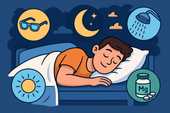
Sleep Biohacking: What Works and What Doesn’t
Biohacking your sleep can sound futuristic — from red light therapy to wearables and supplement stacks. But which hacks actually help, and which are just hype? Discover the science-backed sleep strategies that truly improve rest, recovery, and brain health. 🌙
-
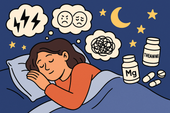
Sleep Support for People with Anxiety Disorders
💭 A restless mind can keep you up all night — thoughts spinning, heart racing, and peace feeling far away. Learn how to quiet overthinking, regulate your nervous system, and create a nightly ritual that teaches your brain to let go and rest deeply. 🌙
-

How to Fall Back Asleep After Waking Up
Waking up in the middle of the night? Learn how to fall back asleep quickly and calmly using breathing techniques, stress-reducing rituals, and natural supplements like magnesium and glycine. Restore your body’s rhythm and wake up feeling refreshed.
-
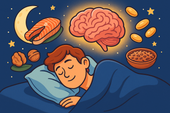
The Role of Omega-3s in Sleep Quality
-
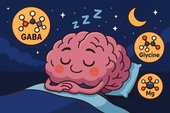
Stacking GABA and Glycine for Deeper Rest
Discover how stacking GABA and glycine can help you achieve deeper, more restorative sleep. Learn how these calming amino acids work together to relax your mind, soothe your body, and improve overall sleep quality—naturally and safely.
-

Overcoming Jet Lag with Supplements
✈️ Jet lag doesn’t have to ruin your trip! Discover how supplements like melatonin, magnesium, L-theanine, and tart cherry can help you reset your body clock faster, reduce fatigue, and recover energy naturally after long flights. 🌙
-
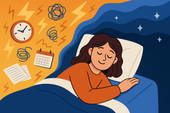
Managing Sleep During Times of Stress
Feeling wired and restless? Learn how to manage sleep during stressful times through nutrition, breathwork, and natural supplements like magnesium and L-theanine. Discover how to calm your nervous system and restore deep, peaceful rest—even when life feels overwhelming.
-

The Role of Magnesium for Night Cramps
Night cramps keeping you awake? Discover how magnesium helps relax muscles, balance electrolytes, and prevent painful spasms. Learn which forms work best, how to take them, and how to pair them with other nutrients for cramp-free, peaceful sleep.
-

Supplements That Reduce Nighttime Awakenings
🌙 Discover science-backed supplements that help you stay asleep through the night. From magnesium and L-theanine to glycine and ashwagandha, learn how these natural compounds calm your nervous system, balance cortisol, and prevent 2 a.m. wake-ups for deeper, more restorative rest.
-

Nootropics That Promote Calm and Rest
Explore the world of calming nootropics — natural brain enhancers that promote relaxation, better focus, and deeper rest. Learn how L-Theanine, magnesium, ashwagandha, and other adaptogens help balance your nervous system, reduce stress, and support restorative sleep.
-

Best Natural Supplement Stack for Sleep
Discover the best natural supplement stack for deep, restorative sleep. Learn how nutrients like magnesium, L-theanine, glycine, and calming herbs such as chamomile and ashwagandha work together to relax your body, calm your mind, and improve sleep quality—naturally and safely.
-

Combining L-Theanine and Magnesium for Sleep: A Calm Night, Naturally
Discover how combining L-Theanine and Magnesium can help you drift into deep, restorative sleep. Learn how this natural duo calms the mind, relaxes the body, and supports your nervous system—without grogginess the next morning.
-

How to Sleep Better After Intense Workouts
Struggling to fall asleep after a tough workout? Learn how to optimize your post-training recovery with nutrition, hydration, and science-backed sleep strategies. Discover how to calm your nervous system, balance hormones, and wake up fully recharged for your next session.
-

Ashwagandha and Valerian: A Bedtime Combo for Deep Rest and Emotional Reset
Discover the calming synergy of Ashwagandha and Valerian root, two natural sleep aids that help quiet the mind, ease anxiety, and promote deeper rest. Learn how this herbal duo supports the nervous system, balances stress hormones, and restores emotional peace — without next-day grogginess.
-

How to Create a Resilience-Boosting Diet
Discover how to build emotional and physical strength from the inside out with a resilience-boosting diet 🍎. Learn which foods stabilize your mood, how supplements like magnesium and omega-3s strengthen your stress response, and why pairing nutrition with breathwork and therapy creates lasting calm, focus, and vitality 🌿💪.
-

Best Teas and Herbal Blends for Calmness: Nature’s Way to Restore Inner Peace
Ashwagandha, the ancient adaptogenic herb, helps your body find balance during stress. Known as “Indian ginseng,” it supports cortisol regulation, boosts energy, and restores calm clarity. Discover how this powerful root promotes resilience, emotional balance, and steady vitality — one cup at a time. 🌸
-

Parenting and Emotional Strength: How to Raise Children Without Losing Yourself
Empathy is the bridge that connects hearts — the quiet power to understand, feel, and support another’s emotions without judgment. Learn how empathy strengthens relationships, enhances communication, and cultivates deeper compassion in everyday life. 🌿
-

How to Bounce Back from Public Failure: Reclaiming Confidence, Purpose, and Power
Visualization is more than imagination — it’s brain training for resilience. By picturing calm, success, or healing, you activate the same neural pathways as real experience. Learn how daily visualization rewires your brain for confidence, emotional balance, and recovery from stress. ✨
-

Coping with Financial Stress Through Resilience: How to Stay Grounded When Money Feels Tight
Body awareness is the foundation of emotional resilience. By tuning into your body’s signals — tension, fatigue, or calm — you learn to recognize stress before it overwhelms you. Discover how mindfulness, gentle movement, and breathwork can deepen your connection with your body and restore balance from the inside out. 🧘
-

How to Stay Positive During Chronic Illness: A Guide to Emotional Strength and Hope
Creativity is more than art — it’s a form of healing. Whether through painting, writing, music, or small acts of expression, creativity helps release emotion, calm the nervous system, and reconnect you to joy. Discover how to use creativity as a tool for emotional balance, resilience, and self-discovery. 🌿
-

Resilience Tips for Caregivers: How to Stay Strong While Caring for Others
Joy isn’t the absence of pain — it’s the quiet strength to find light even in challenging times. Cultivating joy through small daily moments restores balance, releases stress, and reminds you of life’s beauty. Learn how to reconnect with authentic happiness, rebuild emotional energy, and nurture your nervous system through gratitude, presence, and play. 🌿
-

Building Resilience After a Breakup: How to Heal, Rebuild, and Rise Stronger
Social connection is one of the strongest predictors of emotional resilience. During difficult times, genuine relationships act as anchors — calming the nervous system, reducing stress hormones, and helping you regain perspective. Learn how cultivating real human connection can strengthen your mind, heart, and overall well-being. 🌿
-

How to Stay Emotionally Strong During Job Loss
Your emotions are powered by brain chemistry — a delicate balance of neurotransmitters like serotonin, dopamine, and cortisol. When these chemicals work in harmony, you feel calm, focused, and resilient. Learn how daily habits, nutrition, and mindfulness can support your brain chemistry and boost emotional well-being naturally. 🌿
-

The Role of Hormones in Emotional Stability: How Your Chemistry Shapes Your Calm
Hormones shape more than your body — they shape your emotions, resilience, and sense of calm. From cortisol to serotonin, these chemical messengers influence how you react to stress, connect with others, and recover from challenges. Learn how to balance your hormones naturally to build lasting emotional stability and harmony within. 💫
-

Mitochondria and Emotional Energy: The Cellular Power Behind Your Mood
Breathwork is one of the most powerful tools for emotional regulation and cellular balance. Through intentional breathing, you can calm your nervous system, increase oxygen flow to the brain, and even support mitochondrial energy. Learn how conscious breathing connects body and mind — transforming stress into presence and emotional strength. 🌿
-

Inflammation and Its Impact on Mood Resilience: The Silent Link Between Body and Mind
Inflammation doesn’t just affect the body — it impacts the mind. Chronic inflammation alters brain chemistry, depletes serotonin, and makes emotional recovery harder. Learn how calming inflammation through nutrition, mindfulness, and sleep can restore balance, resilience, and a renewed sense of emotional strength. 💫
-

How Antioxidants Protect Emotional Well-being: The Hidden Link Between Oxidative Stress and Mental Health
Antioxidants do more than protect your body — they defend your mind. By neutralizing oxidative stress, antioxidants support serotonin, dopamine, and brain energy pathways that keep you calm, focused, and emotionally balanced. Discover how foods like berries, green tea, and dark chocolate nourish your brain, boost mood, and strengthen resilience from the inside out. 🌿✨
-

The HPA Axis and Emotional Health: The Hidden Bridge Between Stress and Mind
Neuroplasticity — the brain’s ability to rewire and adapt — is the foundation of emotional healing and resilience. When you face stress, trauma, or change, your neural pathways can reshape themselves to support new patterns of calm, focus, and self-awareness. Learn how daily practices like mindfulness, therapy, and breathwork strengthen neuroplasticity to transform emotional pain into personal growth. 🌸
-

Why Cortisol Control Is Key to Resilience: Mastering Stress to Build Emotional Strength
Controlling cortisol — the body’s main stress hormone — is the secret to lasting resilience. When cortisol levels stay balanced, your mind becomes clearer, emotions steadier, and energy more sustainable. Learn how breathwork, mindset shifts, adaptogens, and daily rhythms can help you calm your stress response and build true inner strength. 🌞💪
-

Dopamine’s Influence on Motivation and Recovery: Reigniting Drive and Balance
Healthy relationships are the foundation of emotional balance and resilience. Whether romantic, familial, or platonic, genuine connection releases dopamine, serotonin, and oxytocin — the brain’s “bonding trio” — helping us feel secure, motivated, and seen. Learn how trust, empathy, and communication not only strengthen your connections but also reshape your nervous system for deeper emotional well-being. 🌿🤝
-

The Role of Serotonin in Resilience: How This “Mood Molecule” Shapes Emotional Strength
Serotonin — often called the “resilience molecule” — plays a vital role in how we handle stress, regulate mood, and recover from emotional challenges. Beyond happiness, this powerful neurotransmitter helps balance the gut-brain axis, stabilize the nervous system, and support emotional flexibility. Learn how nutrition, sunlight, mindfulness, and adaptogens can naturally boost serotonin and strengthen your emotional resilience. 🌞🧠
-

How Neuroplasticity Supports Emotional Growth: Rewiring the Brain for Resilience
Neuroplasticity is the brain’s built-in power to grow, adapt, and heal — and it’s the foundation of emotional transformation. Every mindful breath, compassionate act, or reframed thought strengthens new neural pathways that support resilience and self-awareness. Learn how your brain rewires through daily habits, helping you turn emotional challenges into opportunities for growth and calm. 🌿
-

Tai Chi and Adaptogens for Mind-Body Balance: The Art of Harmonizing Energy and Resilience
Alchemy isn’t just an ancient science — it’s a timeless symbol of transformation and inner balance. By blending the physical and spiritual, alchemy teaches us that change begins from within. Just as metals are refined into gold, we too can transmute emotional pain, stress, and chaos into clarity and strength through mindful practice and self-awareness. 🌙✨
-

Cold Therapy and Emotional Control: Training the Mind Through the Body
Cold therapy isn’t just for athletes — it’s a tool for emotional mastery. By exposing your body to controlled cold, you train your nervous system to stay calm under stress, improving focus, mood, and resilience. This article explores the science of cold exposure, its impact on hormones and the vagus nerve, and how ice baths and cold showers can help you build emotional control, one breath at a time. 🧊🧘♂️
-

How Music Influences Emotional Recovery: The Healing Soundtrack of the Mind
Neuroplasticity — the brain’s ability to rewire and heal itself — is at the heart of emotional recovery. Through mindful habits, music, therapy, and consistent mental stimulation, your brain can form new connections that support resilience and well-being. Discover how neuroplasticity turns pain into growth, helping you rebuild balance, focus, and emotional strength. 🌿
-

Nature Therapy for Building Resilience: Reconnecting With the Healing Power of the Earth
Nature therapy helps rebuild emotional resilience by reconnecting you with the healing rhythms of the Earth. From forest walks to sunlight exposure, nature restores balance to your nervous system, lowers stress hormones, and teaches emotional adaptability. Learn how spending time outdoors can enhance mental clarity, calm anxiety, and awaken your natural capacity to heal. 🌞
-

Breathwork Techniques That Pair with Supplements: The Ultimate Synergy for Stress Relief and Mental Clarity
Breathwork and supplements create a powerful mind-body synergy for stress relief, focus, and energy. By combining intentional breathing with adaptogens, nootropics, and calming nutrients, you can naturally regulate cortisol, sharpen mental clarity, and boost emotional balance. This guide explores the best breathwork techniques and supplement pairings to help you feel centered, calm, and energized from the inside out. 🌿
-

Why Cortisol Balance Matters for Emotional Strength
Balancing cortisol — your body’s main stress hormone — is essential for emotional resilience. When cortisol is chronically high, your mind stays stuck in survival mode, leading to fatigue, anxiety, and emotional instability. This article explores how nutrition, supplements, breathwork, and therapy can help restore healthy cortisol rhythms, regulate the nervous system, and strengthen your ability to handle life’s challenges with calm focus and emotional strength. 🌿
-

Best Supplements for Students During Exam Season: Focus, Energy, and Memory Support
Studying late into the night? Learn which natural supplements can boost focus, memory, and mental stamina during exam season — without the crash. From omega-3s to Bacopa and Rhodiola, discover your brain’s ultimate exam support stack. 🎓🧠
-

Natural Memory Boosters for Seniors: How to Keep Your Mind Sharp and Focused
Stay mentally sharp and confident as you age. Discover science-backed natural supplements and lifestyle habits that boost memory, focus, and brain longevity for seniors. 🌿🧠
-

The Link Between Stress, Cortisol, and Memory Loss
Chronic stress can quietly erode your memory — and cortisol is the key culprit. Learn how stress hormones affect the brain, why the hippocampus shrinks under pressure, and how natural strategies can help you restore memory and mental clarity. 🧠✨
-

How to Build a Daily Supplement Routine for Memory Health
Want to sharpen your memory and stay mentally clear? Learn how to build a daily supplement routine for memory health — from morning focus to nighttime brain repair. Discover science-backed nutrients that boost recall, focus, and long-term cognitive resilience. 🧠🌿
-

Top 5 Natural Supplements for Memory Recall and Focus
Looking to boost memory and concentration naturally? Discover the top 5 supplements — Bacopa, Ginkgo Biloba, Lion’s Mane, Rhodiola, and Phosphatidylserine — that enhance focus, recall, and long-term brain health. 🧠✨
-

Top Supplements to Balance Mood Naturally
From omega-3s to adaptogens, discover the top natural supplements proven to support emotional balance, reduce stress, and promote inner calm — safely and effectively. 🌿✨
-

Can Omega-3 Fatty Acids Help with Mood Disorders?
Omega-3 fatty acids do more than support heart health — they can help balance mood, reduce depression, and calm anxiety. Discover how EPA and DHA nourish your brain, fight inflammation, and support emotional well-being from within. 🌊🧠


















































